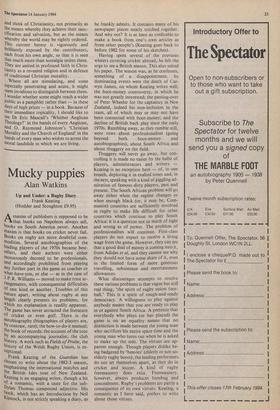Mucky puppies
Alan Watkins
Up and Under: a Rugby Diary Frank Keating (Hodder and Stoughton £9.95)
Amaxim of publishers is supposed to be that books on Napoleon always sell, books on South America never. Another Maxim is that books on cricket never fail. Books on rugby are more doubtful com- modities. Several autobiographies of the leading players of the 1970s became best- sellers, and their authors were either Monstrously decreed to be professionals, and accordingly prohibited from playing any further part in the game as coaches or what-have-you, or else — as in the case of J.F.R. Williams — moved to make trust ar- rangements, with consequential difficulties of one kind or another. Troubles of this nature apart, writing about rugby at any length clearly presents its problems, for which no explanation is readily apparent. The game has never attracted the literature of cricket or even golf. There is the autobiography (biographies of players are, by contrast, rare); the how-to-do-it manual; the book of records; the account of the tour by an accompanying journalist; the club history. A work such as Fields of Praise, the history of the Welsh Rugby Union, is ex- ceptional.
Frank Keating of the Guardian has chosen to write about the 1982-3 season, emphasising the international matches and the British Isles tour of New Zealand. Keating is an engaging writer, though a bit of a romantic, with a taste for the sub- Dylan Thomas compound adjective. His book, which has an Introduction by Neil kinnock, is not strictly speaking a diary, as
he frankly admits. It contains many of his newspaper pieces neatly stitched together. And why not? It is at least as creditable to make a book from one's own articles as from other people's (Keating goes back to before 1982 for some of his sketches).
Having spent several of the previous winters covering cricket abroad, he felt the urge to see a British season. This also suited his paper. The season was, as he confesses, something of a disappointment. Its dominating events were the death of Car- wyn James, on whom Keating writes well; the boot-money controversy, in which he was not greatly interested; the passing-over of Peter Wheeler for the captaincy in New Zealand, indeed his non-inclusion in the team, all of which may or may not have been connected with boot-money; and the decline of British back play since the early 1970s. Rumbling away, as they rumble still, were rows about professionalism (going beyond both boot-money and autobiographies), about South Africa and about thuggery on the field.
Thuggery will never go away, but con- trolling it is made no easier by the habit of players, administrators and writers Keating is no exception here — of, in one breath, deploring it in exalted tones and, in the next, speaking with a kind of giggling ad- miration of famous dirty players, past and present. The South African problem will go away either when the regime changes or when enough black (or, it may be, Com- munist) countries are sufficiently involved in rugby to make life difficult for other countries which continue to play South Africa: it is a question not so much of right and wrong as of power. The problem of professionalism will continue. First-class players do not expect to receive a living wage from the game. However, they can see that a good deal of money is coming into it, from Adidas et al, and they cannot see why they should not have some share of it, even in the limited form of more generous travelling, subsistence and entertainment allowances.
What discourages attempts to resolve these various problems is that vague but still real thing, 'the spirit of rugby union foot- ball.' This is a spirit of rough-and-ready democracy. A willingness to play against anybody means that you are ready to play in or against South Africa. A pretence that everybody who plays (or has played) the game is on an equality means that no distinction is made between the young man who sacrifices his entire spare time and the young man who turns out when he is asked to make up the side. The virtues are ap- parent enough. Though players dislike be- ing badgered by 'heavies' (elderly or not-so- elderly rugby bores), the leading performers do not set themselves apart, as they do in cricket and soccer. A kind of rugby freemasonry does exist. Freemasonry, however, always produces humbug and concealment. Rugby's problems are partly a consequence of its own virtues. Keating, a romantic as I have said, prefers to write about those virtues.






































 Previous page
Previous page